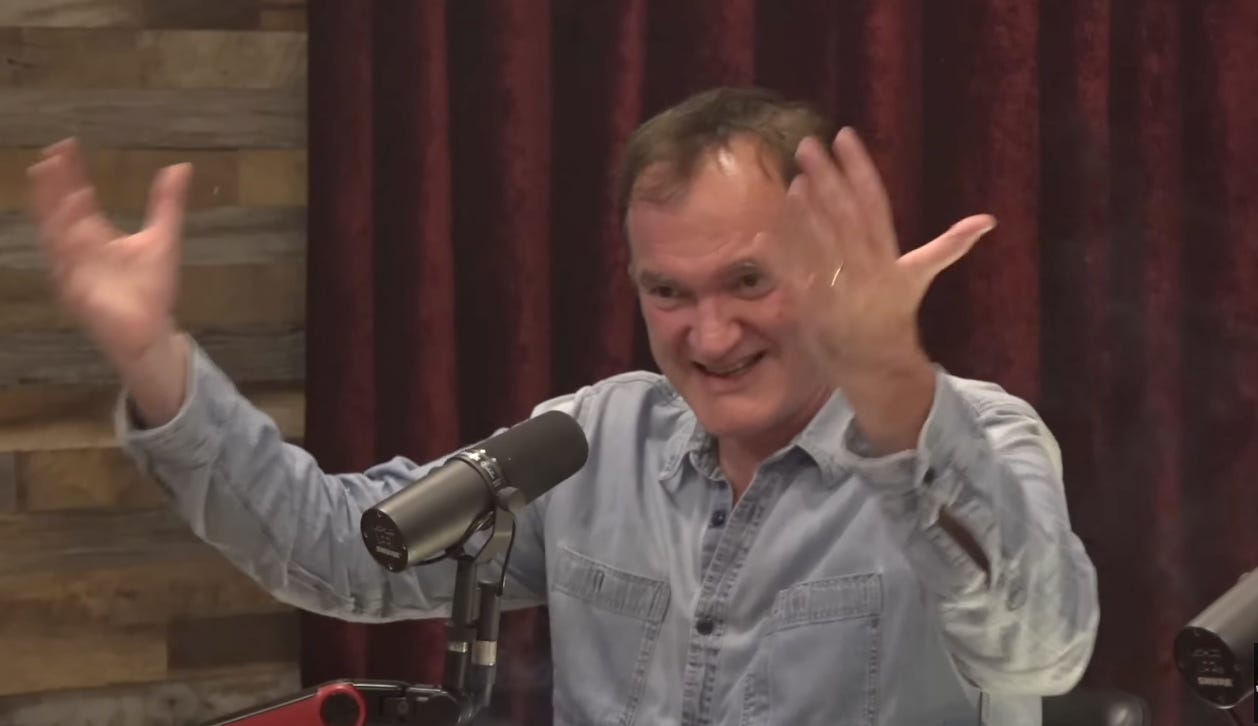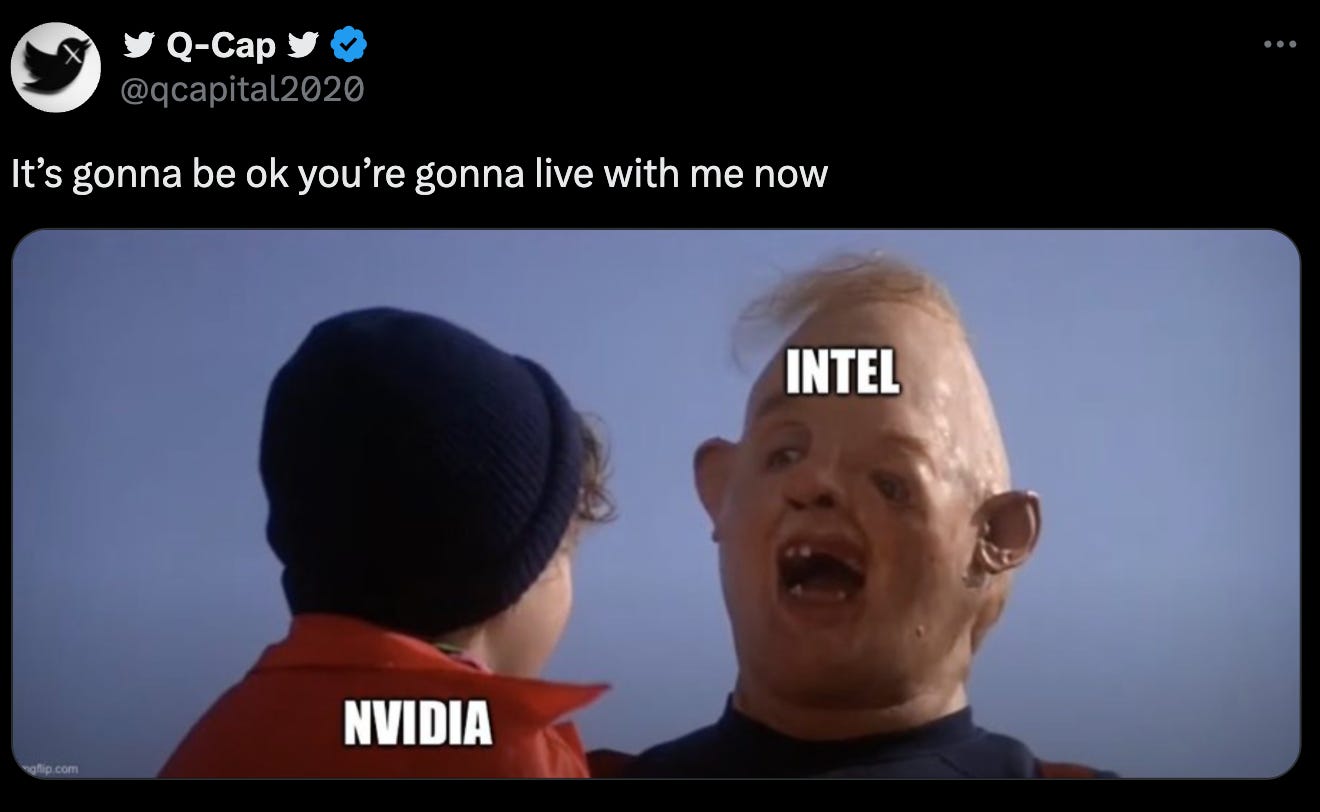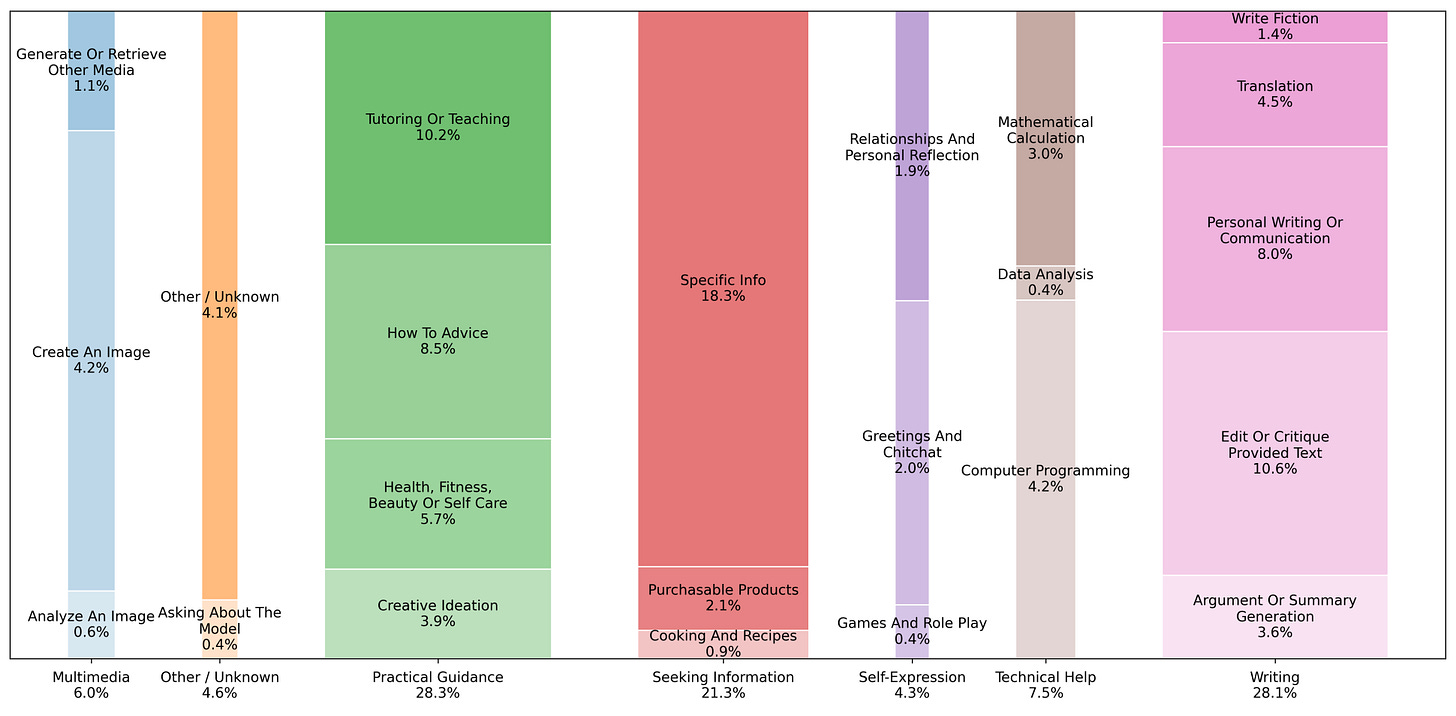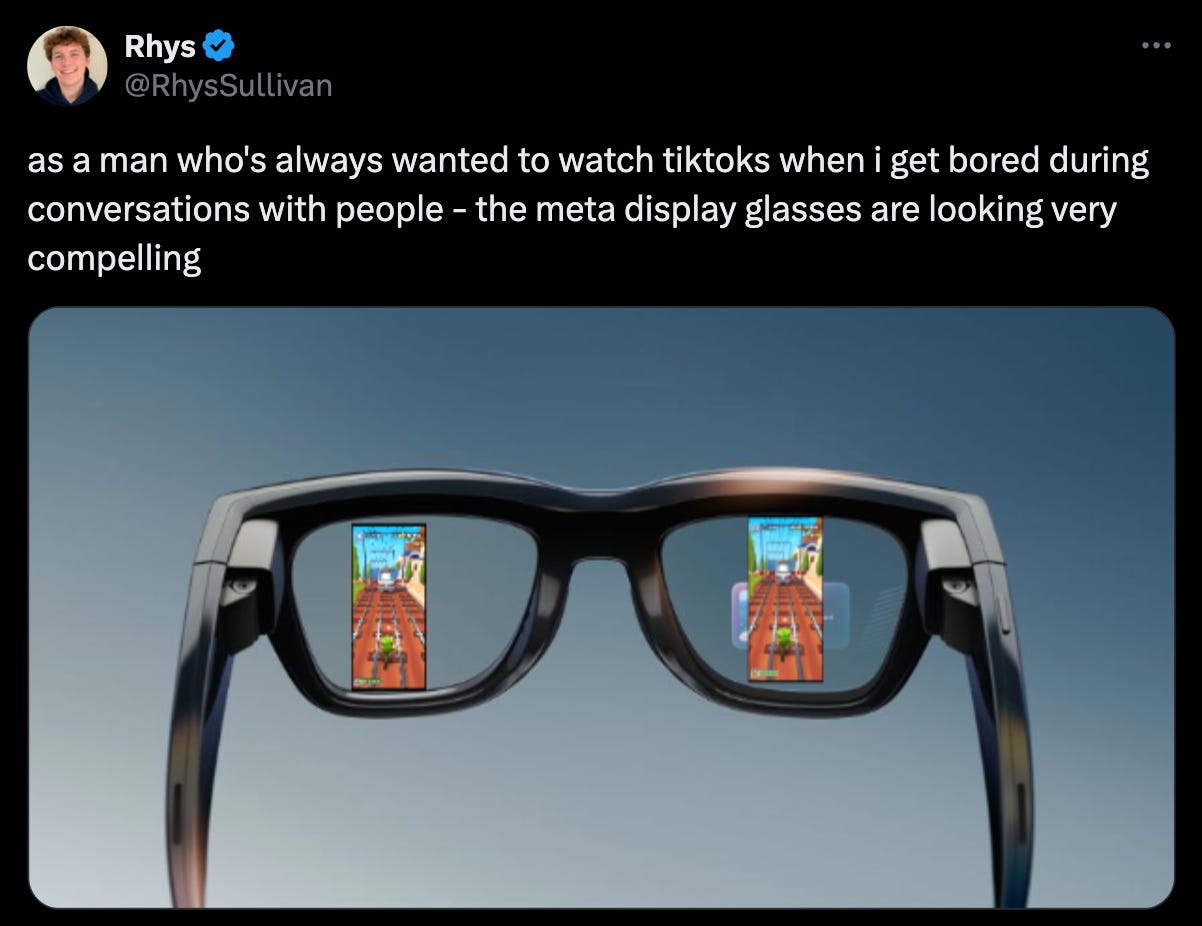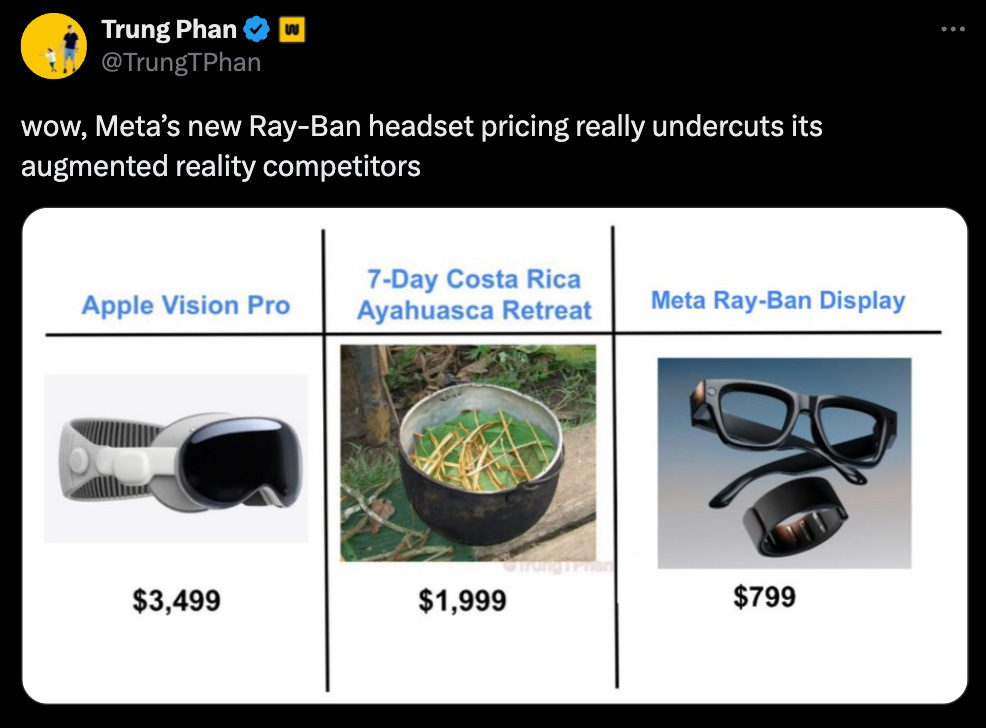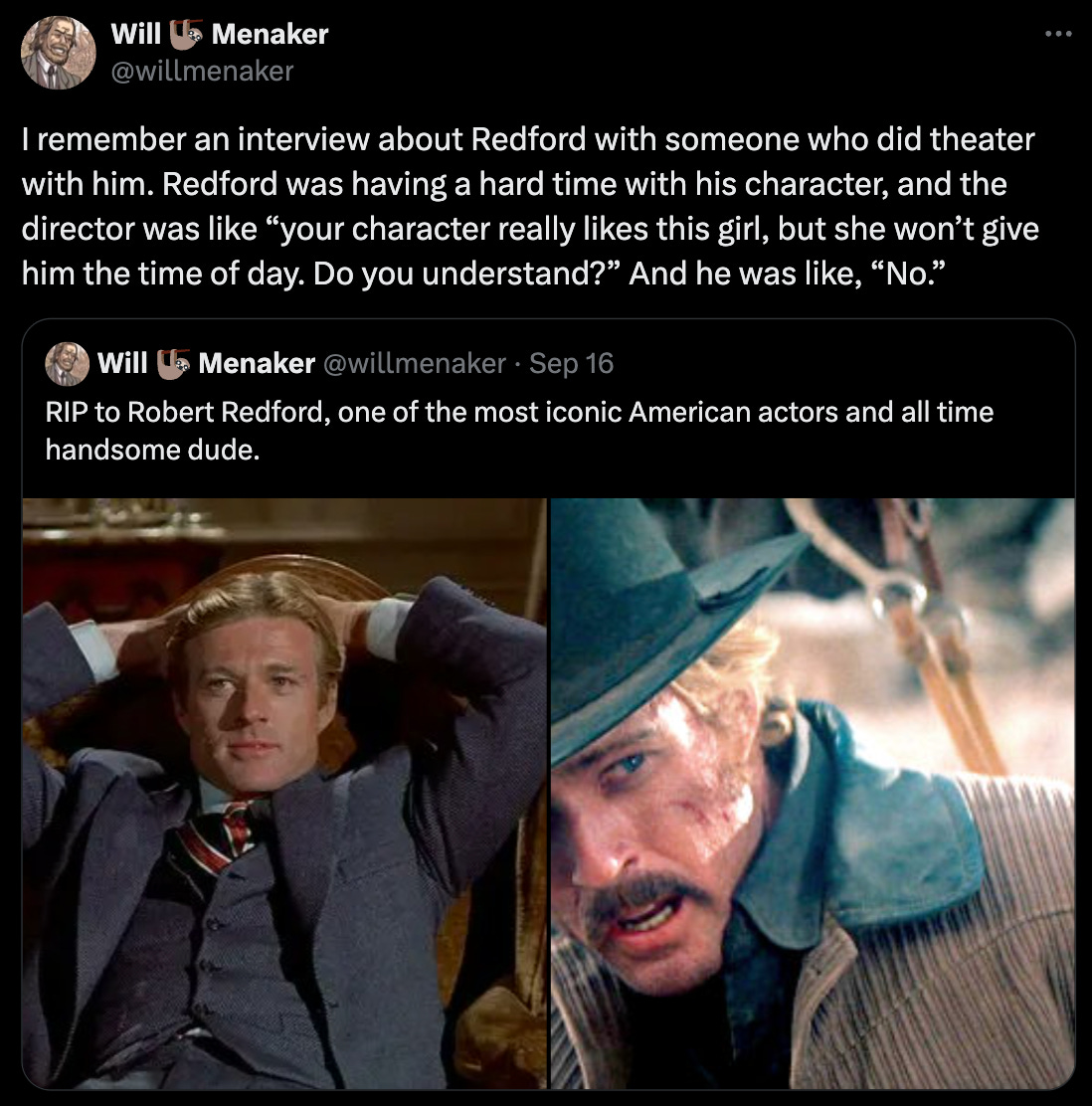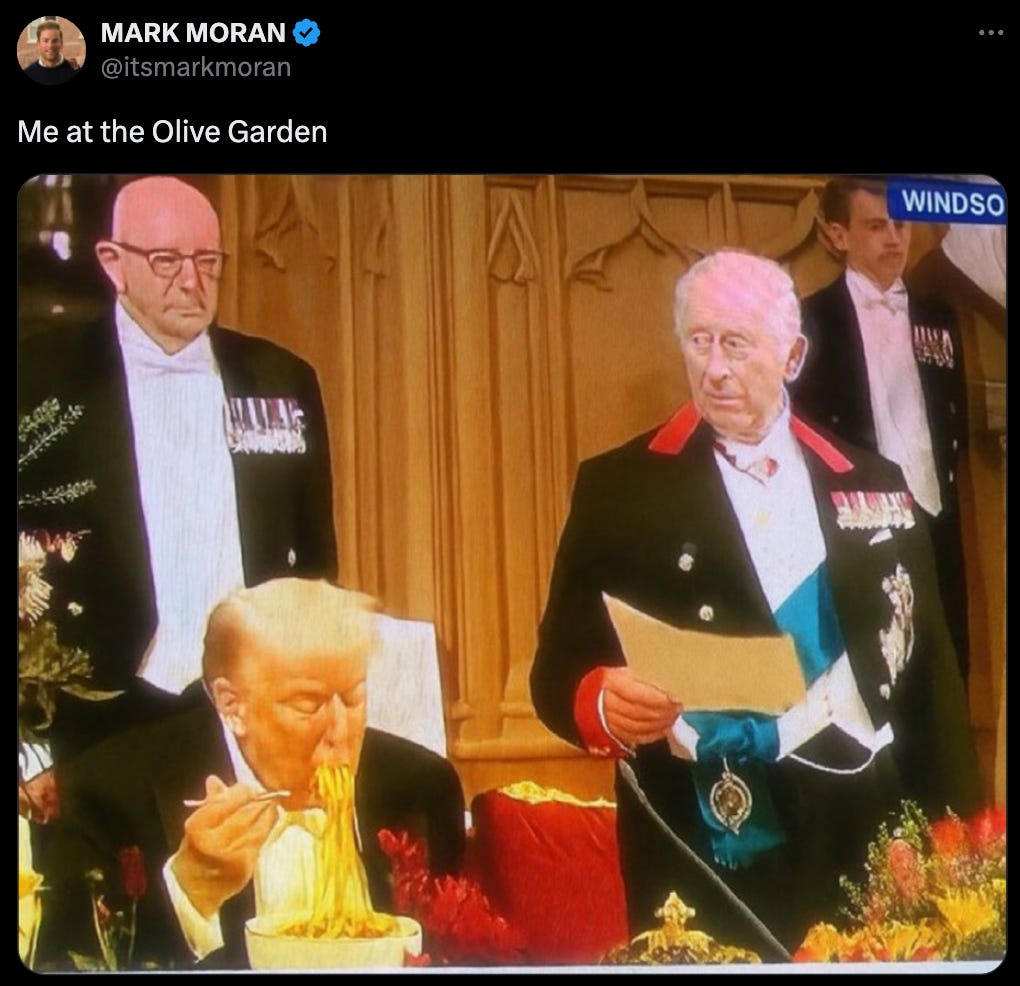The Day Quentin Tarantino Became A Filmmaker
"Instead of falling back into my routine, I decided to change my life. I [decided] to move to Hollywood and meet other people in the business."
Thanks for subscribing to SatPost.
Today, is a round up of some interesting reads, watches and listens including:
The Day Quentin Tarantino Became A Filmmaker
AI Stuff (Intel x Nvidia, Amazon Agents, OpenAI Use Cases, Meta Ray-Ban)
Jimmy Kimmel Pulled Off Air By Bob Iger
RIP Robert Redford (The Greatest Hollywood Career?)
…and them wild posts (including LimeWire)
The Day Quentin Tarantino Became A Filmmaker
There is a podcast called The Church of Tarantino Podcast.
It’s a weekly show dissecting Tarantino films from every possible angle imaginable. Turns out Tarantino actually listens to the podcast and, in August, they hosted him for one of the most meta podcast episodes ever (this would be like Huy Fong’s David Tran showing up to my monthly Sriracha hot sauce making competition…which, David, the invitation is very open…please reply to this email).
Tarantino has some great insights about his 30+ year career. I’ll share the best excerpts below, but first want to flag my favourite piece of career-related Tarantino lore.
At the end of 2024, the 62-year-old director told Joe Rogan about the exact day he decided to pursue a film career.
Tarantino is such a great storyteller that he riffed for ~10 minutes building up to the exact moment he made the decision.
In his early-20s, Tarantino was working as a video store clerk for Video Archives in Manhattan Beach, California.
He was always interested in making films but tells Rogan that the job took the fire and ambition away from him:
I was thinking of making my own stuff for a long, long time.[However], I did fall asleep for a few years. Working at the video store, I got caught up in the little life there. […]
It’s one of those things where [the video store job] isn’t my dream. I didn’t want to work at a video store for years. I wanted to make movies.
But it’s dream-adjacent. It’s close to my dream. I get to watch movies all f**king day. I get to talk about movies all f**king day.
I’m not working at a pizza parlour. I’m not busting ass as a bartender…I’d go to this video store if I wasn’t paid to go to this store. But for a couple of years, [the video store job] put me to sleep. It put my ambition to sleep a little bit because I was happy enough.
But there was a “life-changing day” when he “got the fire back again”.
So, Tarantino had a roommate that was five years older named Steve-O. The day Steve-O turned 30, Tarantino remembers that his friend's personality changed. Steve-O was always a funny guy but became angrier and more bitter. He had spent his 20s hanging out with people Tarantino’s age and not accomplishing any of his professional goals.
“I wasted my life hanging out with a bunch of guys just like you,” Steve-O told Tarantino in one rant.
Soon, Steve-O started hanging out with more people closer to his own age.
Tarantino said that Steve-O’s personality change was “showing me a truth”.
That truth was that Tarantino didn’t want to be a bitter 30-year old.
When Tarantino turned 25, he had “anxiety…seeing what it’s like five years from now when you turn 30” and decided to take stock of his life:
There was one night when I did [something I called] a “Quentin Detest Fest”.
I’d stay up all night long and — rather than giving myself excuses — I'd spend all night laying out what I was doing wrong [with my life] and spending two hours on how I would change it.
Instead of falling back into my routine, I decided to change my life. I [decided] to move to Hollywood and meet other people in the business. I shouldn’t be making money until I’m making money what I want I to do.
Indeed, Tarantino packed up and moved to Hollywood. Well, the closest he could afford, which was in Koreatown.
He started meeting people making low-budget horror movies and began building a network in the film industry.
“If these guys can do it,” Quentin realized. “I can do it. Within a year and a half, I was finally able to make a living as a writer.”
At 27, he sold the script for True Romance for $50k. In 1992 — when he was 29 — that film hit theatres, directed by Tony Scott and starring Christian Slater. That same year, Tarantino made his directorial debut with Reservoir Dogs.
Two years later, he released his second film Pulp Fiction, starring Samuel L. Jackson and John Travolta.
Then, Tarantino turned 32 on March 27, 1995. This was the same day as the Academy Awards…and he won a Best Original Screenplay Oscar for Pulp Fiction (along with Roger Avery).
Tarantino has now done 9 feature films (he counts Kill Bill series as one): Reservoir Dogs (1992), Pulp Fiction (1994), Jackie Brown (1997), Kill Bill: Volume 1 (2003), Kill Bill: Volume 2 (2004), Death Proof (2007), Inglourious Basterds (2009), Django Unchained (2012), The Hateful Eight (2015) and Once Upon a Time in Hollywood (2019).
He plans to finish one more and leave a 10-film body of work, which will certainly rank among the greatest ever.
Look, I know there are probably thousands of other people that made Tarantino’s same realization and went to Hollywood and never realized their dreams.
Having said that, Tarantino's story is pretty damn relatable story. Lulling yourself into complacency while having fun with the homies and doing “dream-adjacent” things but putting your real ambition “to sleep” because you’re “happy enough”.
People do that in their 20s, 30s, 40s and beyond.
Tarantino made a drastic change and we should all be incredibly happy it worked because the Mr. Wolf scene in Pulp Fiction is some of the greatest dialogue in the history of the written word.
***
Highlights From the Church of Tarantino Interview
The 3 Best of His Own Films: “Well, I guess Inglourious Basterds is the best film I made. Once Upon a Time in Hollywood is my favorite. But I think Kill Bill is the ultimate Quentin movie. Like nobody else could have made it. Every aspect about it is so particularly ripped — like with tentacles and bloody tissue — from my imagination and my id and my loves and my passions and my obsession. So, I think Kill Bill is the movie I was born to make. I think Inglourious Basterds is my masterpiece, but Once Upon A Time In Hollywood is my favorite.”
The Sacrifices He Made Early In Career: “I'm the guy who did not let life get in my way artistically. That was my life for the last 30 years. And I wasn't looking to get married and I wasn't looking to have children [Tarantino got married in 2018 and now has two kids]. I wasn't looking to have anything that was more important than the journey. And there was nothing more important than the journey. The journey always came first. The mountain. I always made it a mountain-climbing analogy. So, Kilimanjaro and Mount Fuji and Everest, they were always the most important things. I've done my time. That doesn't mean I'm an old man now and that everything is lesser. But like I said, I've done it and I'm just enjoying this time.”
The Excitement Of Doing Something New (Which Is Why Tarantino Decided Not To Direct The Spin-Off or Sequel to Once Upon A Time In Hollywood): “I got into pre-production [for a Once Upon A Time In Hollywood spin-off]. It was the same f**king thing…I love this script, but I'm still walking down the same ground that I've already walked, and…there was no question that the ship would arrive at port. There was no question that we won't sink. There's no ceiling for me to hit the head of my talent on. And it just kind of un-enthused me as we went forward.
So, I finally just pulled the plug. [The 10th and last film I do], I've got to be in uncharted territory and have an idea how I'm going to pull it off, but not really know. There has to be something to achieve.”
On The Value of Creating Scarcity (After He Got Back Full IP Rights for Kill Bill): “I love my old work, but I'm not all that about mining it and taking from it and spinning off from it…In this world, that everything is available and everything is for profit and everything is a chip to be sold on the market because everything is owned by corporations. [Kill Bill is] not owned by a corporation. That's owned by me. The fact that you have to come to my theater [where he occasionally screens the film] to see it, and it's not just sitting on a stack of DVDs and Blu-Rays that you get around to watching eventually…The minute it becomes in your hand, it just means less.
All right, but the thing is the fact that it's playing at a theater. Now you guys came to see it and you got it in just the best way. And no, you can't lend it to your friend. Now you're going to have to tell your friends about it and they're going to be jealous of you. That just happens so f**king rarely now that there's something really, really cool about having something that's just not a button away.”The Legacy He Wants People In 50 Years To Think Of Him: “[Using] your 50-year analogy, I hope that I have the same impact that Hitchcock has today. [People will see] I did my things in my time and I did them well and I create a certain thing that you get from my stuff and then other people took it and did their own things with it. But if you want the real deal, you go to me. And each generation picked it up and made it their own.”
Go listen to the interview.
This issue of SatPost is brought to you by Bearly AI
Is your team or enterprise looking for a custom AI chat tool…
…based on your specific data, UX and business needs?
Try Bearly AI, which has been working with enterprise clients to connect their organizations with leading LLMs (Claude, ChatGPT, Grok, Gemini) including customizable UXs, API management dashboards and complete data privacy.
Hit that blue button to book a demo with our team.
AI Round-Up (Intel x Nvidia, Amazon Agents, OpenAI Use Cases, Meta Ray-Ban)
If you haven’t heard yet — and you probably should have based on the ad just before this section — there is an industry called “AI”, which is short for “artificial intelligence” and every single day there is an impossible amount of news to keep up with.
Last week was particularly heavy on the news front:
***
Nvidia Invests $5B Into Intel For A ~4% Stake: The US government recently took a 10% stake in Intel, so it’s not surprising that Intel was able to score a key strategic investment from Jensen Huang and the world’s most valuable company ($4T). Intel PUMPEEEEEDD on the news, rising 23% to $142B. The move comes after China recently blocked its tech companies from buying the export-controlled Nvidia chips. This is either negotiating to get access to better Nvidia chips or full-on “China is building a future Nvidia competitor and everyone in China needs to get onboard”. Nvidia will have to work closely with the US government either way — especially after Trump posted an AI-generated image of him buying INTC in the oval office (actually) — and agreeing to help Intel co-design data centre and AI chips makes sense on that front.
A best-case scenario for Intel is something approximating Microsoft’s $150m investment in a floundering Apple in 1997 (for 5% of the company), per QTR’s Fringe Finance. Outcome unlikely to be as lucrative but there are parallels. Finally, someone on X called Intel “America’s Nepo Baby Foundry” and that made me laugh…so there’s that.
***
Amazon AI Agents: Amazon is making a big bet on “AI-driven commerce” per Marketplace Pulse. The e-commerce giant is rolling out AI agent features for sellers that will book inventory shipments, monitor listings for compliance violations, and build marketing campaigns. If these features work — and it is a massive “if” because “AI agents” have so far been a business dud on par with “IoT” and “McDonald’s McPizza” — customers will benefit with better vetted products and services. This could be a huge boon for my monthly haul of productivity notebooks and guides that I never end up using.
***
OpenAI use cases: OpenAI just released a study on the main ChatGPT use cases and it’s top 3 categories are:
Practical Guidance (28% of total): Tutoring, how to, health, ideation.
Writing (28%): fiction, translation, personal comms, editing, summary.
Seeking info (21%): specific info, purchasing products, cooking recipes.
The main use cases for the remaining 23% include image creation, math calculation and relationship/personal reflections.
Overall, more than 70% of the use cases is non-work related. At least half of these use cases have direct overlap with Google search (practical guidance, seeking info) and ChatGPT’s road to ads is more obvious than ever.
I was kind of shocked that image creation was only 4% of use cases based on how often I’m making tasteless memes (but this probably makes sense because ChatGPT throttles image making on the free tier). Also, coding only accounts for <5% of total use which further cements the idea that OpenAI is pushing its coding tool Codex in large part to undercut its Anthropic.
***
xAI is building the world’s largest AI data centre called Colossus 2…but the Memphis government is giving the project a lot of pushback, so Elon’s answer was to buy “develop a Gigawatt-scale energy hub right across the border in Southaven, Mississippi” and the photo says it all.
***
Meta Ray-Ban Connect: Zuck’s spent something like $100B on the Metaverse including a ton of hardware development. He’s spent probably a similar amount of money on various AI efforts. He also spent $500k+ on a custom Porsche Minivan, which — speaking as a parent — might be the coolest of the bunch.
On Wednesday, he launched a brand new product called Meta Ray-Ban Display which marries those two visions (hehe). Imagine Google Glass but it actually works with the user controlling it via a “neural wristband” and at a cost of $799. Well, kind of. The live product demo had a few snafus. But respect for doing it live. The product is Meta’s attempt to move past the smartphone because Zuck doesn’t want to be beholden to Tim Cook and Sundar Pichai. Zuck says this form factor is actually the best one for AI because it can see and hear what the user does. Meta Ray-Ban Display overlays information on the world the user does see and hear. It blends the physical and digital world (instead of accessing the digital world through a “5-inch screen”) and, presumably, allows the user to stay present.
The Ray-Ban partnership is important to make them actually fashionable and wearable. They will also only be sold in store, so people can test them. Recall, Google Glass aficionados were called “Glassholes”. These do look way better but then you also have to wave your hand around with the “neural wristband”, which could be goofy AF too. Will need to test to confirm.
If we’re going down this route, my gut still tells me Apple will figure out the form factor and end up winning in the category (no matter how many Apple Vision jokes we’ve made). Actually, that’s not the right take. Zuck mentioned that he’s willing to sell the glasses at lower margin and monetize with AI service-related revenues. More likely is Meta (and whatever Google does with Pixel) just plays the part of Android for smart glasses. Apple sells fewer units but takes most of the profit.
But whoever “wins”, the whole “person wearing glasses may be recording you” is a bit creepy and it’s not clear that’ll become a social norm. The other obstacle for smart-glasses is that there is massive pushback right now against smartphone addiction and “always being plugged in”.
In an interview with Alex Heath, Zuck said one of his main use cases for the glasses is to pull information while chatting with someone IRL without having to grab his phone. Is this really a better setup? Does this actually make us more “present”? I dunno.
RIP Robert Redford (The Greatest Hollywood Career?)
Legendary actor Robert Redford died last week. He was 89.
Bill Simmons and Chuck Klosterman a deep dive on Redford’s career and think he may have had the best all-around Hollywood career ever (starts at the 1:08:00 mark):
Acting: Born in 1936, he starts acting in 1960 and catches his break alongside Paul Newman in Butch Cassidy and The Sundance Kid (1969). Arguably, the greatest Western film ever. Then does arguably the greatest political, (The Candidate, 1972), caper (The Sting, 1973), conspiracy thriller (Three Days of the Condor, 1975), (All The President’s Men, 1976) and sports (The Natural, 1985) film ever. Notably, he used his stardom and clout to make the politiically sensitive Watergate-film (All The President’s Men) come to life.
Directing: Few actors have transitioned to directing as well as he did. His directorial debut Ordinary People (1980) won Best Director and Best Picture. Redford later directed A River Runs Through It (1992), which made Brad Pitt a megastar. Notably, Redford was basically Pitt in the handsome-as-hell-and-can-act-hall-of-fame through the 70s and 80s. The other banger film he directed was Quiz Show (1994).
Later Stage: Redford’s most commercially successful film was Indecent Proposal (1993), when he propositioned Woody Harrelson to sleep with his wife Demi Moore. The Redford film I saw the most was Sneakers (1992), which was a hacker-caper film that I rented between 40-50x at Blockbuster with an insane cast including Ben Kingsley, Mary McDonnell, Sidney Poitier, River Phoenix, James Earl Jones, Dan Aykroyd.
The only other Hollywood personality with the longevity and scope of work was Clint Eastwood (Simmons and Klosterman say that Tom Cruise was probably the best pure movie star of all time).
What sets Redford apart is his founding of the Sundance Film Festival in Park City, Utah (it’s moving to Colorado).
He lived in Utah to get away from Hollywood and, similarly, the Sundance Film Festival was meant as another path to filmmaking and pioneered independent film. The festival helped launch the careers of Stephen Soderbergh, Darren Aronofsky, Quentin Tarantino, James Wan, Nicole Holofcener, David O. Russell, Ryan Coogler, Robert Rodriguez, Chloé Zhao and Ava DuVernay.
If we needed any more evidence that Redford had the best all-around Hollywood career, his final on-screen appearance was in the culmination for the most successful film franchise ever (and, apparently, did it because his grandchildren loved the films): Avengers: End Game.
Incredible run.
Jimmy Kimmel Taken Off Air
Disney-owned ABC pulled the late night talk show “indefinitely” based on inaccurate statements the comedian made about the murder of Charlie Kirk. This has kicked off a debate on government censorship and free speech. But the mechanism for pulling Kimmel is actually business-related.
ABC distributes content through regional affiliate stations.
In recent years, two of these affiliate networks with conservative leanings — NextStar and Sinclair — have been rolling up local TV stations across America. NextStar is currently trying to close a $6B deal with another large network and requires FCC approval.
The fate of this deal gives the FCC and Trump White House leverage because licenses for public airwaves are controlled by the government. It’s the similar leverage used over CBS when its parent Paramount was trying to close an $8B merger with SkyDance. FCC’s head used the leverage when he publicly called out ABC to reprimand Kimmel.
Disney CEO Bob Iger and Disney’s TV Head Dana Walden convened an emergency meeting with the affiliate heads — along with Kimmel — to see if the comedian could make a statement to address the issue. The affiliates also voiced concern that advertising in their markets wanted action against Kimmel. The group couldn’t come to a resolution and Iger decided to yanked Kimmel.
This sequence of events definitely looks like government suppression of speech (the tactic of the government using a third-party to censor speech is known as “jawboning” as it relates to the First Amendment).
From a business standpoint, Kimmel’s late night show — much like Colbert’s recently cancelled show with CBS — is in structural decline. And by “structural decline” I mean "they employ 200 people and cost $100m to produce while Joe Rogan’s show costs Jamie’s salary and two Shure mics…and literally, no one under 30 watches these things anymore” (the 90s heydays were wild, though). These shows would probably have been chopped anyways. But now it’s happening with unprecedented government pressure.
Another way to frame the business angle: the South Park guys have been going very hard on the Trump administration and are not at risk of getting pulled because they are rainmakers for Paramount (and just signed multi-billion dollar deals). Similarly, SNL has caught Trump’s ire over the years but it still puts up decent numbers and incredibly unlikely NBC would pull the iconic show due to government pressure.
However, Iger and Disney are in a very tight spot. On the one hand, Iger is trying to depoliticize the brand so customers of all political persuasions will go to Disneyland to buy $25 bottles of Dasani water. On the other hand, his Kimmel decision has already pissed off a lot of creatives, who say they won’t work with Disney until he’s reinstated (and Kimmel — moreso than Colbert with CBS — really is the face of ABC, including hosting “Who Wants To Be A Millionaire” and has hosted the Oscar’s a number of times, which is exclusively broadcasted by the network).
Kimmel could also just walk and build a massive platform based on this moment. SiriusXM or Spotify might throw him a 9-figure bag. To wit: Conan has been very successful in his post-talk show life (although, I’d say that Conan is objectively much funnier).
The Town podcast has a breakdown of the situation and thinks Kimmel may end up back on the air after an apology. Disney has rights to NFL games, which could help it negotiate with more conservative-leaning affiliate networks including NextStar and Sinclair.
Here is a range of other Kimmel takes including Matt Taibbi (“Notes On Jimmy Kimmel”), Jeff Mauer (“The Kimmel Cancelation Is a Million Times Worse Than Colbert”) and Nic Carter (“Both Sides Are Hypocrites”).
Links and Memes
Some other links for your weekend consumption:
The Pandemic (Kinda) Ruined Zoom: Of all the pandemic-era stocks, few got the COVID bump like Zoom. It hit a peak of $160B in Q4 2020 but has now fallen to $25B. The NYT interviewed Zoom CEO Eric Yuan and he says the pandemic boom was bad for the organization because it grew too fast (then had to resize) and also the Zoom “brand” became “too strong”, making it hard to do its current attempt at an enterprise AI pivot.
Bribing Auditors With Strippers: In a story straight out of The Sopranos, executives at RCI Hospitality — which operates ~60 strip clubs across America (including Miami and New York) — were indicted for bribing an auditor with lap dances. Basically, strip club patrons buy “Dance Dollars” from the club and redeem them for..umm..dances. RCI skirted tax payments it was supposed to make on “Dance Dollar” sales and then bribed the New York State auditor to give them favourable treatment…with dances. One auditor got “13 complimentary multi-day trips to Florida, where he was given up to $5,000 per day”. Craziest corporate America stripper story since Enron’s Lou Pai.
“Why Billionaires Are Piling Into Prediction Markets”: Prediction markets Kalshi and Polymarket are fundraising at valuations for $5B and $9B, respectively. Good overview of the competition from Forbes.
A professor in Shenzhen did a martial arts test on a Unitree Humanoid Robot…to see how it would react. The robot falls on the mat and instantly bounces back up like Jackie Chan’s famous Kip-Up move. Thinking we should pause this particular skill development.
…and them fire posts:


